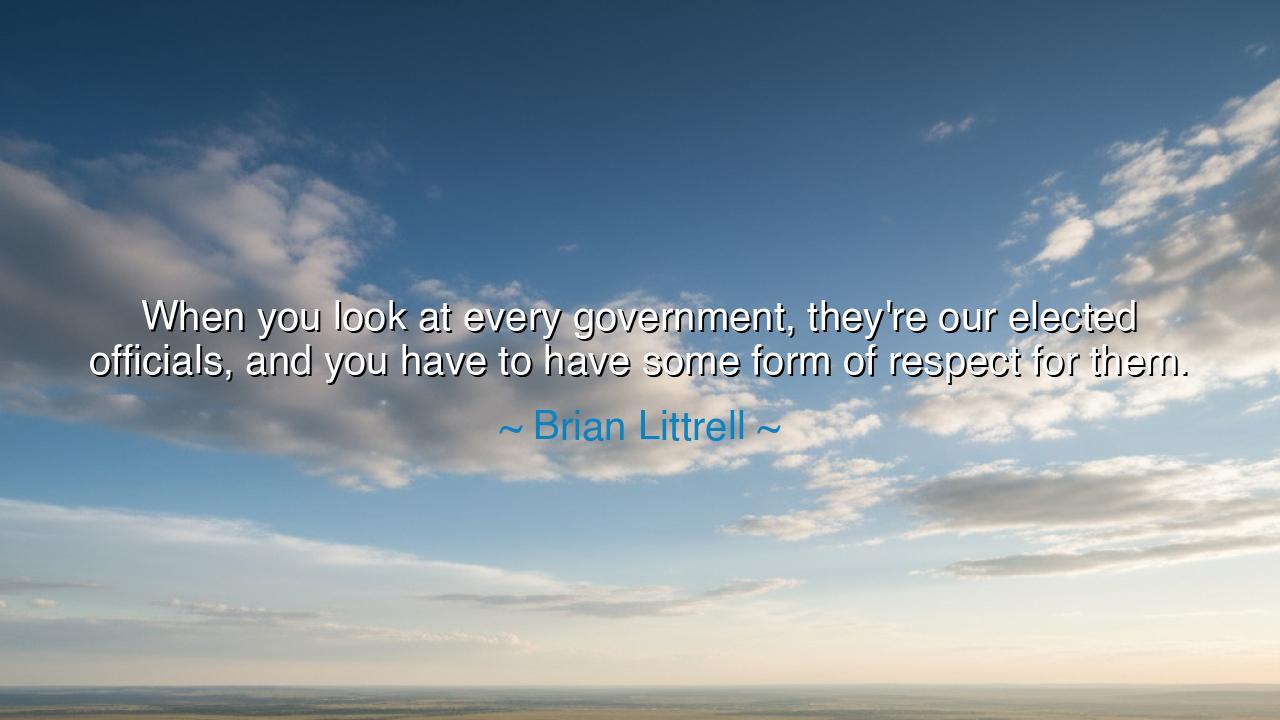
When you look at every government, they're our elected officials
When you look at every government, they're our elected officials, and you have to have some form of respect for them.






“When you look at every government, they're our elected officials, and you have to have some form of respect for them.” Thus spoke Brian Littrell, not as a politician or philosopher, but as a man of conscience — one who understands that the foundation of society is not agreement, but respect. His words, simple yet profound, remind us of a truth as old as civilization itself: that authority, however flawed, is woven into the fabric of order, and that respect for governance is not submission, but the recognition of the structure that allows peace, discourse, and progress to exist.
Littrell’s statement was born not from political allegiance, but from the moral conviction that civility must outlast disagreement. In an age when anger shouts louder than reason and contempt has replaced dialogue, he calls us to remember that leaders, though imperfect, are reflections of those they serve. They are not divine, yet they carry a sacred trust — the mandate of the people. To respect them is not to worship them, but to honor the system that gives voice to the governed. For when respect dies, chaos rises, and the law becomes a battlefield of resentment rather than a covenant of peace.
The ancients knew this truth well. In the Roman Republic, citizens revered the senatus populusque Romanus — “the Senate and People of Rome.” Even when leaders faltered or became corrupt, the Romans were taught to honor the office, if not always the man who held it. Cicero, that great orator and defender of the republic, warned that disrespect for governance is the seed of tyranny, for when the people mock authority, they invite the strongman to seize it by force. Thus, Littrell’s words echo not mere politeness, but the wisdom of ages: that respect is the shield of democracy, protecting it from the poison of disdain.
To respect elected officials is not to blind oneself to their failures. On the contrary, true respect demands accountability. It demands that the citizen stand tall — neither groveling before power nor scorning it — but engaging with it as a partner in the shared duty of governance. Littrell’s call is for a mature kind of patriotism, one that sees beyond party and pride, one that understands that nations are built not by constant rebellion, but by responsible participation. The citizen who despises all leaders abandons the field to corruption; the citizen who reveres them blindly becomes complicit in injustice. But the one who respects the system while reforming it stands as the guardian of freedom itself.
Consider the story of George Washington, the first President of the United States. When his term ended, many begged him to remain in power, even to become a king. But Washington refused, choosing instead to step down and transfer authority peacefully. This act of humility set a precedent for all who would follow: that leaders are servants of the people, not masters. Yet, his people, in turn, respected him so deeply that their gratitude became the foundation of the republic. Washington’s greatness lay not only in command, but in restraint; the people’s respect for him ensured that his power remained honorable, not oppressive. So too must every generation learn to balance reverence and responsibility, respect and reason.
Littrell’s words also remind us that respect for leaders is a reflection of respect for ourselves. The leaders we elect arise from among us — they mirror our virtues and our vices. To despise them entirely is to despise our collective reflection. But to hold them accountable, to call them to higher standards while still honoring the dignity of their office, is to honor the very idea of democracy. In this way, respect becomes not a sign of weakness, but of strength — the discipline of a free people who can disagree without destroying, critique without contempt, and demand better without despairing.
So, my children, take this wisdom to heart: Respect is the soil in which freedom grows. Without it, the tree of liberty withers into arrogance and anarchy. When you speak of your leaders, do so with honesty, but also with the restraint of one who understands the cost of civility. When you oppose, do so not with hatred, but with conviction and grace. For nations are not sustained by laws alone, but by the virtues of their citizens — patience, dignity, and the courage to respect even when it is difficult.
Let this, then, be the lesson of Brian Littrell’s words: that respect does not mean silence, nor obedience without question. It means understanding that governance, for all its flaws, is a sacred trust between the rulers and the ruled. Honor that bond. Guard it. And remember that every insult hurled at your leaders, every cynicism that corrodes faith in the system, chips away at your own power as a citizen. Speak truth to authority, yes — but do it with respect, for in respecting the structure that holds your freedom, you uphold the dignity of the nation itself.






AAdministratorAdministrator
Welcome, honored guests. Please leave a comment, we will respond soon